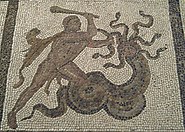
Back Hades Afrikaans Hades (Gott) ALS Hades AN هاديس Arabic هيدز ARZ হেডিচ Assamese Hades AST Aid Azerbaijani Hades BAR Hades BCL
| Hades | |
|---|---|
| |
 | |
| Abode | Greek underworld |
| Symbol | Cornucopia, Cypress, Narcissus, keys, serpent, mint plant, white poplar, dog, pomegranate, sheep, cattle, screech owl, horse, chariot |
| Personal information | |
| Parents | Cronus and Rhea |
| Siblings | Poseidon, Demeter, Hestia, Hera, Zeus |
| Consort | Persephone |
| Children | Macaria, and in some cases Zagreus, Dionysus,[1] and the Erinyes |
| Equivalents | |
| Roman equivalent | Pluto, Dis Pater, Orcus |
| Part of a series on |
| Greek mythology |
|---|
 |
| Deities |
| Heroes and heroism |
| Related |
|
|
Hades (/ˈheɪdiːz/; Greek: ᾍδης, translit. Hā́idēs, Attic Greek: [háːi̯dεːs], later [háːdεːs]), in the ancient Greek religion and mythology, is the god of the dead and the king of the underworld, with which his name became synonymous.[2] Hades was the eldest son of Cronus and Rhea, although this also made him the last son to be regurgitated by his father.[3] He and his brothers, Zeus and Poseidon, defeated their father's generation of gods, the Titans,[4] and claimed joint rulership over the cosmos. Hades received the underworld, Zeus the sky, and Poseidon the sea, with the solid earth (long the province of Gaia) available to all three concurrently. In artistic depictions, Hades is typically portrayed holding a bident[5] and wearing his helm with Cerberus, the three-headed guard-dog of the underworld, standing at his side.
Roman-era mythographers eventually equated the Etruscan god Aita[6] and the Roman gods Dis Pater and Orcus with Hades and merged all these figures into Pluto, a Latinisation of Plouton (Greek: Πλούτων, translit. Ploútōn),[7] itself a euphemistic title (meaning "the rich one") often given to Hades.
- ^ Collard & O'Sullivan 2013, p. 297: "Zagreus, i.e. 'Great Hunter', a cult-title of Dionysus in Orphism, identified here with Hades' son [...]"
- ^ Cartwright, Mark, "Hades", World History Encyclopedia, retrieved 29 June 2015.
- ^ Reckoning by this reverse order is preferred by Poseidon in his speech at Homer, Iliad 15.187.
- ^ Apollod. 1.2.1
- ^
Bane, Theresa (29 May 2020). Encyclopedia of Mythological Objects. McFarland Myth and Legend Encyclopedias. McFarland. p. 30. ISBN 9781476639208. Retrieved 24 August 2023.
Hades's pitchfork[:] The bident (a two-pronged spear) was the traditional weapon of Hades (Roman god Dis/Pluto), the god of the Underworld, in classical Greek mythology; his black bident had the ability to create earthquakes [...].
- ^
Palmer, Abram Smythe (1882). "Hades". Folk-etymology: A Dictionary of Verbal Corruptions Or Words Perverted in Form Or Meaning, by False Derivation Or Mistaken Analogy. London: G. Bell and Sons. p. 480. Retrieved 24 August 2023.
Another form of the same word may be Aita, Hades, the Pluto or King of the Shades in the Etruscan mythology, whose majestic figure, with his name attached, has been discovered in the wall paintings of the Grotto dell' Orco at Corneto [...].
- ^ Cite error: The named reference
:6was invoked but never defined (see the help page).